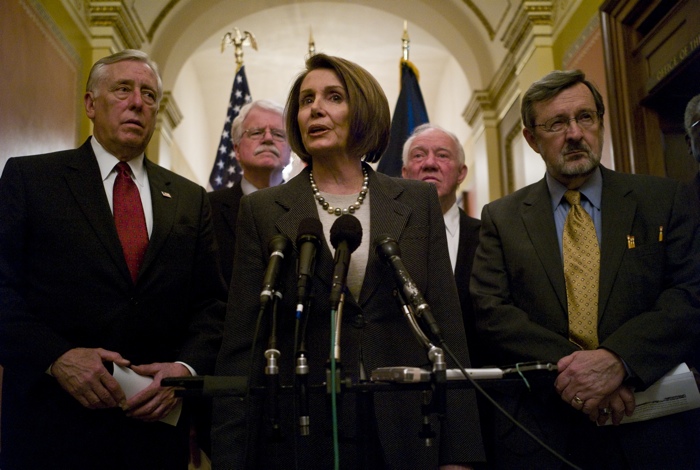House Democrats believe they will secure additional health care reform votes from Blue Dog Democrats thanks to the Senate’s more conservative version of the legislation. And despite deep misgivings, the House Democratic leadership expects to lose few if any progressive Democratic votes over the demise of the public option, paving the way to get a final bill to President Obama’s desk by Feb. 1.
As the Senate prepares for a final vote to clear the bill, TPMDC chatted with several top House aides to get a sense of where things stand and what can be expected over the next few weeks. There are four key sticking points to be negotiated: the public option, abortion language, immigration and how taxes are applied to pay for it.
Leadership aides say progressives are prepared to take it on the chin and will vote for a final bill without a public option. But they say pro-life Democrats will seek direction from the U.S. Conference of Bishops as to whether they can support an amendment weaker than Rep. Bart Stupak’s, thus setting up what will likely be the most difficult negotiation before a final vote.
Senate Democrats have repeatedly warned that any substantive changes to the bill they will pass tomorrow night will lose the fragile 60-vote coalition they’ve built, and it looks like they will get their way.
“I don’t see how we don’t largely accede to the Senate,” a House leadership aide said.
The House bill raises taxes on people earning more than $500,000 per year and the Senate’s does not. House aides point out the idea actually polls well and suggested they could meet in the middle and increase the income threshold for the new tax so it affects fewer people. Also, unions are not happy with the Senate’s plan to tax high-end insurance plans so the House will argue that point.
Our sources tell us they expect a swift conference committee made up of relevant House chairmen Reps. Charlie Rangel (D-NY), Henry Waxman (D-CA) and George Miller (D-CA) but that most of the tough negotiating on the items above will be done by leadership and the White House health care team outside of the formal conference process. They expect it to function in a similar fashion as the perfunctory February conference on the $787 billion economic stimulus, which lasted less than a week.
The consensus among leadership aides is that the report would be completed and approved by both chambers in mid to late January, before Obama gives his first official State of the Union address.
“A long conference committee doesn’t serve anyone’s interests besides Republicans,” one aide said.
Another Democratic aide told TPMDC that rank-and-file members are irritated Obama has shown more deference to his former colleagues in the Senate throughout the entire process. Still, the aide conceded that members are going to have to accept the Senate version because they are ready to be done with the fight.
“I don’t think you’ll see that much that’s left up to chance, the negotiations will likely play out much farther in advance,” the aide said.
Progressives will demand a good explanation from Senate colleagues on how choice and competition can be accomplished through their bill, another aide said.
“It would serve the House well to go another round on this, it’s important to send a message to our base and some of our progressive allies that we’re not just going to roll over on this,” the aide said.
In 2010 it will prove politically valuable to have picked the fight, even though progressives understand it won’t make the final compromise, the aide said. But it’s not clear what that fight will amount to beyond a lot of grousing for effect on TV, all with the knowledge that in the end they will have no choice but to give way.
On the immigration front, aides believe that a promise of comprehensive immigration bill will probably be enough to quell any House dissent about illegal immigrants not being allowed to get coverage under the new legislation.
Leadership believes these issues can all be dealt with, noting weary staffers and members want to clear the decks.
“It’s time to pass a good bill and move on” so members can start campaigning on its benefits for the 2010 midterm elections, an aide said.
The confidence that Democrats would add to the 219 members who supported their bill last month is thanks to the Senate bill being substantially less progressive than the bill the House passed in October, several aides said.
Democrats doubt they will get any Republicans – and may even lose the lone one they had, Rep. Joseph Cao of Louisiana – but think Blue Dogs will have a hard time voting against legislation that cuts the deficit while also having no public option. The numbers give them political cover, aides said.
Aides said despite the political discouragement from progressive members, there is optimism the bill will actually help people and do a lot of good, even at its most bare bones.






